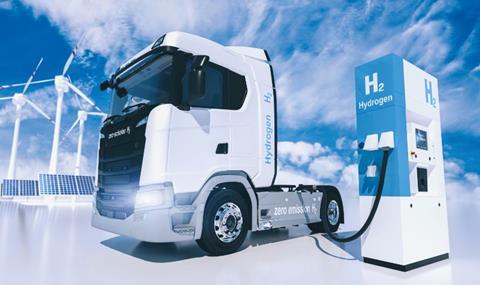
The road to zero carbon emissions will need big changes to the refuelling and charging infrastructure, according to industry specialists attending last week’s CM Show who agreed that hydrogen is now a viable alternative to electric.
A specialist conference panel comprised of Mark Griffin, market development manager – Clean Fuels, BOC Gases; Danny Jones, director, Off Grid Energy; David Horsfall, director of property, Tylesey Energy Park and Dr Duncan Yellen, MD, ITM Motive.
Yellen claimed there was still considerable “misunderstanding” over hydrogen but claimed it was “the Heineken of fuel – reaching the parts other fuels can’t reach”.
“Lots of people are saying ‘electrify everything’, and I completely agree,” he said. “But if we do that we will need about six times as much zero carbon electricity as we produce now.
“We’ll also have to get it down the grid which will need about four transmission and distribution grids. It will be extraordinarily difficult, but fortunately we have an alternative in the shape of hydrogen. We can produce hydrogen from electricity.
“That’s why we need to go big with hydrogen. The UK now has the world’s largest gigafactory, it’s a leader in green hydrogen.”
Griffin agreed that there was “huge potential” for hydrogen, either used on its own or injected as a dual fuel.
He called for the development and storage of more green hydrogen production close to city clusters and suggested the existing gas network could be used to transport it.
“There’s now a strong appetite for hydrogen HGVs and we need to engage with vehicle OEMs to develop something for the UK market,” he said.
“It will be a mixture of battery electric and hydrogen for net zero but we need to support the expansion of those vehicles in the UK by having hydrogen available at ports for example.
“There’s been a lot of investment in ONG and CNG and it might be that hydrogen is next.”
Yellen agreed it was still early days for 44-ton hydrogen HGVs – “but come next summer it will be a lot easier to gain access to that size of vehicle when we have refuelling stations available.
“I’m sure we’ll go down the same route as we’ve seen with CNG with trials. We’re already in talks to manufacturers offering trial vehicles.”
Meanwhile, Jones admitted there were still many challenges in terms of alternative fuels, particularly over grid capacity and “range anxiety”.
“Moving to alternate premises or investing in a grid upgrade could be very costly,” he said. “And large fleets descending on refuelling stations at the same time can cause huge spikes in demand for energy.”
However, he said solutions were now available including smart charge management to control peak demand.
“Sometimes even that isn’t sufficient,” he added, “so another option is to introduce battery energy storage as a solution. The key benefit here is that it can be delivered in short time, it becomes a valuable asset and it can potentially earn revenue. It can be combined with smart charging.”
Horsfall said Tylesey would be used as “a test centre for alternative fuel where the winners can evolve”.
“There will be a combination of fuels to meet demand over the next 10 years,” he said. “We want to cater for all the different needs. We want local fleets who can’t afford to transition but want to participate in trials to engage with us, right up to a big carrier ready to invest in hydrogen or electric or bio gases, all of which we can cater for.”














